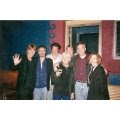
Artist: John Mellencamp
Title: Life, Death, Love and Freedom
Writer: Rick Galusha
It’s a human trait to dwell on mortality: it’s where religion is rooted. Since recorded history began musicians have released recordings of this pondering; perhaps none so much as those of the roots genres including blues. However, like political criticism, it is an easily fumbled message and few can carry the torch beyond one, maybe two songs in the span of a career.
After finding commercial success early in his career John Mellencamp dropped the ‘Cougar’ moniker and began to turn his music-making towards a more roots based sound. While musically snobby 40 something’s may have written off Bloomington’s sage as “a hack” long ago, in 1985 Mellencamp released an album, ‘Scarecrow’ which lent a Midwestern credibility to the cultural landscape that heretofore had been rooted on coastal seaboards. Bruce Springsteen made New Jersey a state with romantic ballets in the streets: Mellencamp sang of farm foreclosures, national pride and growing up in 50’s seeing life from a ‘rumbleseat.’ Suddenly the lure of the living within spitting distance of Los Angles and New York City was not as bright as it had been and, finally, being from the Midwest, and its small town manners, was kinda cool.
When Mellencamp fully embraced a ‘roots’ sound to his music is debatable; however, by the 1993 album, ‘Human Wheels’ it was clear that writing hits was off the agenda. Although the title track was radio friendly, the voice of the album spoke of deeper thoughts and the music took on a rawer edge. Radio and retail no longer asked what had happened to John, we all knew, he’d pulled a Neil Young and chose art over commerce… finally put the finishing fork in the pop star, “Johnny Cougar.” Casting aside any lingering fears, Mellencamp ventured into liberal activism, whether political or social (ala’ founding Farm Aid along with Neil Young and Willie Nelson), Mellencamp’s new personification, ‘Lil’ Bastard’ had taken over.
With the release of his latest album, ‘Life, Death, Love and Freedom’ (LDLF) Mellencamp fully realizes this transition with, perhaps, his strongest artistic statement to date. At first glance the album is full of morbidity: apparently the ‘Lil’Bastard’ is afraid of something. LDLF is a 14 track testament to one man’s midlife reconciliations. The opening track, ‘Longest Days’ sets the tone as the Mellencamp sings,
“So you pretend not to notice,
That everything has changed,
The way you look,
And the friends you once had.
So you keep on acting the same,
But deep down in your soul,
You know you got no flame.
And who knows then which way to go?
Life is short even in its longest days.’
It has been a long time since a lyric resonated as when he sings,
‘Sometimes you get sick,
And you don’t get better,
That’s when life is short,
Even in its longest days.’
While the subject matter is heavy, and the music is compelling, Mellencamp’s latest effort is the finest full length album from one of Classic Rock’s pantheon. While other’s struggle to find a new voice that fits with their aging bodies, Mellencamp saddles up and bangs away with a album that shows, finally, that aging and music can remain symbiotic. It is as if the age-old struggle between Jagger and Richards has finally been settled; you can be “great” and release exceptional music even though “midlife” is now in the rear-view mirror.
Not one to miss an opportunity, Mellencamp hoists up the social commentary albeit using a thinly veiled analogy in the song, ‘Without a Shot.’ He takes a swipe at false nationalism.
“We open our eyes at midnight,
Seeing the setting of the sun.
Foundation are crumbling; The inner structure’s gone;
Used up by corruption,
And the passage of time.
We hope we got some fight left,
Cause our children, our children are dying.”
Within the same tune he rails against false piety with resonation.
“So we think that forgiveness,
Is a God given right.
And equality for all,
Is just a waste of time.
With our nickel-plated Jesus,
Chained around our necks;
Handing out versus of scripture,
Like we wrote it down ourselves.”
A compact disc is the equivalent of a double album set. Over the past 50 years you can probably count, now on two hands, the number of studio-recorded-rock-double-albums that maintain a high level of quality throughout ( Exile on Main Street, Quadrophenia, Electric Ladyland, London Calling, Blonde on Blonde are a few). I readily suggest that, ‘Life, Death’ Love and Freedom’ be added that select group of records. ‘Life, Death, Love and Freedom’ is a thinking man’s roots album that is rich in textures with carefully crafted songs and arrangements; it is a brilliant musical statement…albeit by a “hack” from Indiana.











No comments:
Post a Comment